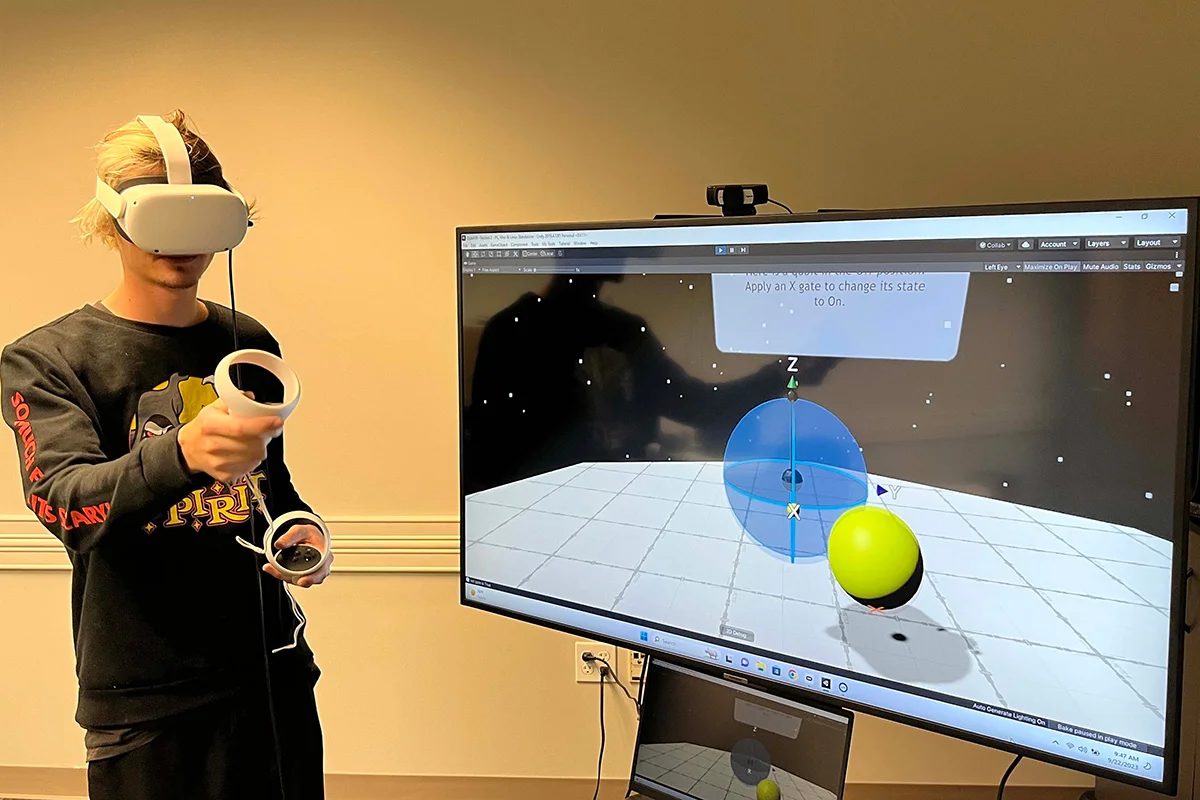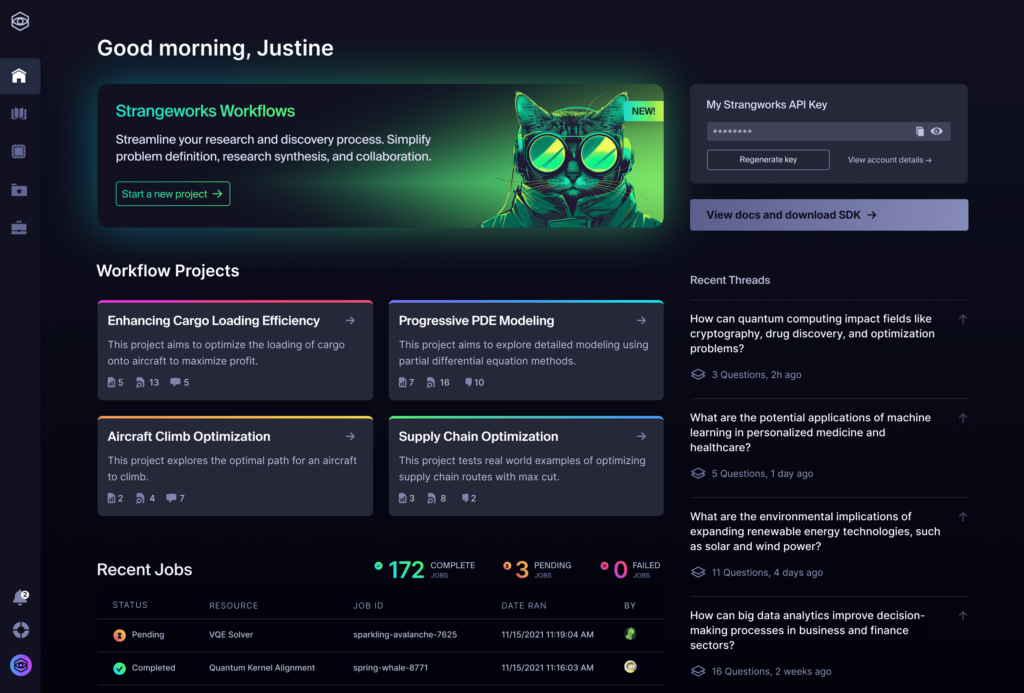Insider Brief
- University of Central Florida, University of Texas at Dallas and Vanderbilt University researchers have received a three-year, $927,203 grant for advancing future quantum education by using virtual reality.
- The project will evaluate QubitVR and intelligent tutoring versions of the VR application through lab-based studies and undergraduate QIS courses.
- Story Robert Wells, UCF News
UNIVERSITY NEWS — Researchers from the University of Central Florida, University of Texas at Dallas and Vanderbilt University have received a three-year, $927,203 grant for advancing future quantum education by using virtual reality (VR) and machine learning to identify and address misconceptions regarding quantum information science (QIS).
The U.S. National Science Foundation-funded project started in August 2023 and leverages QubitVR, a quantum-education VR application previously developed at UCF through the computer science senior design program.
The project will evaluate QubitVR and intelligent tutoring versions of the VR application through lab-based studies and undergraduate QIS courses. The project will also result in the development of desktop and smartphone versions of QubitVR for broader impacts.
UCF will be responsible for the iterative development of QubitVR — including the machine-learning-based intelligent tutoring versions, conducting the lab-based studies and evaluating QubitVR through an undergraduate QIS course. UCF has received $500,000 for these efforts, and Ryan McMahan, an associate professor of computer science, is the lead principal investigator for the project at UCF. Eduardo Mucciolo, a professor of physics at UCF, is also senior personnel for the project.

Quantum computing leverages quantum mechanics principles in which particles can be in multiple places and states simultaneously to achieve vastly enhanced processing power.
“For example, the encryption that keeps your email safe and your password safe — a quantum computer could crack that in minutes,” McMahan says. “So, there’s a lot of potential power there.”
McMahan says the possibilities of quantum computing are enormous, but the complexity of the field, including misconceptions about phenomena such as superposition and components such as quantum logic gates, can be a barrier to entry.
But by using VR, educators can provide tangible, visual understandings of quantum mechanics that empower students and professionals to harness the power of quantum computing, he says.
Training the Workforce
McMahan says that currently many of the people working in quantum computing have very strong ties to quantum physics, but there are fewer computer scientists involved who would have the skills for writing new quantum algorithms.
“If we can train people where they have a good conceptualization for the quantum mechanics but also have strong algorithmic backgrounds, we’ll actually see more quantum computing algorithms develop,” McMahan says. “Currently, there are only a few well-known quantum computing algorithms because it’s so hard to understand these concepts and how to utilize them to take advantage of quantum computing.”
These algorithms could be used for cryptography, security, big data analysis and more.
Several companies and institutions have developed quantum computers, although the technology is still in the early stages of development. These computers also face limitations, such as the need to operate them at extremely low temperatures to minimize environmental interference of quantum bits of information.
Keerthan Reddy Rajulapally, a UCF student pursuing a master’s degree in computer science, is working as a graduate research assistant on the project. His role includes developing the software and the QubitVR application.
Our goal is to create a VR application which has an intelligent tutoring system implementing different machine learning models to teach ‘hard to understand subjects or topics’ with ease,” Reddy says. “Through QubitVR, we are trying to teach quantum computing, but we can always design a different application tailored for a specific subject.”
The graduate research assistant says he has always been interested in gaming, and after being introduced to VR gaming and then McMahan’s virtual reality engineering course, he became hooked and wanted to pursue research in the field.
“With this project we hope to help both the teachers and students alike,” he says. “We are revolutionizing teaching and redefining ‘learning’ by giving students an interactive, fun 3D experience where they can truly understand the essence of a topic.”
Collaborative Research
The project started as the result of a conversation McMahan had with Michael Kolodrubetz, an assistant professor of physics at the University of Texas at Dallas, about how VR might be great for education on challenging concepts such as quantum mechanics.
“We got to talking and started collaborating on QubitVR soon after,” Kolodrubetz says.
Kolodrubetz’s role in the project will be as the quantum expert, through both his research on non-equilibrium quantum mechanical systems and his teaching on quantum mechanics for non-physicists.
“My group will help adapt QubitVR to target the most salient, hard-to-grasp points in quantum information science and allow students to visualize them in the context of VR,” he says.
Kolodrubetz says that quantum mechanics and information is becoming increasingly relevant to technology as it scales down to small enough sizes where classical physics ceases to be a useful explanation.
“Despite this, most STEM students learn little to no quantum science, and those that do often struggle to understand quantum phenomena due to misconceptions about how quantum systems should behave based on their experience in the classical world,” Kolodrubetz says. “By allowing interactions with quantum systems of technological relevance, QubitVR will lower the barrier to breaking these misconceptions and provide groundwork for understanding that may lead to further technological advancement.”
Kelley Durkin, a research assistant professor with Vanderbilt University who studies children’s misconceptions in mathematics, will serve as the learning scientist on the team.
She will help develop a new assessment of students’ knowledge of quantum information sciences, identify misconceptions students show when learning about quantum information sciences and will suggest ways to adapt QubitVR to directly address students’ misconceptions.
“Often, people just try to address students’ misconceptions by telling them they are wrong and showing them the correct answer,” she says. “QubitVR provides a unique opportunity to not only identify where students’ misunderstandings are but also to provide them with problems to challenge those misconceptions in real-time.”
“Hopefully, QubitVR will reduce barriers to students understanding quantum information sciences and will make the field more accessible to students,” she says.
Researcher Credentials
McMahan received his doctoral degree in computer science and application from Virginia Tech and joined UCF’s Department of Computer Science, part of the College of Engineering and Computer Science, in 2019.
If you found this article to be informative, you can explore more current quantum news here, exclusives, interviews, and podcasts.




















